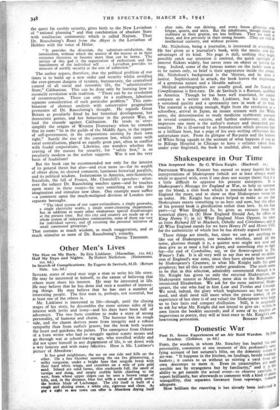Shakespeare in Our Time
This Sceptred Isle. By G. Wilson Knight. (Blackwell. Is.) PROFESSOR WILSON KNIGHT has earned so many laurels for his interpretations of Shakespeare (which are at least always worth while to quarrel with, even if one does not accept them) that it is a little difficult to appraise his present enterprise. It is Shakespeare's Message for England at War, to help us summon up the blood, a slim book which is intended to make us love England the more, and to show us that Shakespeare wrote for us today. Mr. Knight has always helped to make us see that Shakespeare means something to us here and now, but the effect of his present book is glorification rather than love. In his four parts—(a) What England Is, he gives us extracts from the historical plays; in (b) How England Should Act, he offers us King Henry V; in (c) What England Must Oppose, he takes us from Richard III to Macbeth, Othello and Coriolanus; and in (d) What England stands for we have Henry IV and Henry VIII, for the authenticity of which last he has already argued bravely.
These things are timely, but, since we can get anything we like out of Shakespeare, one wonders whether, amid all this noise, glorious though it is, a quieter note might not now and then give us at once a foil to glory, and something
else to fight for—the end of Cymbeline, say, or the flower-speech in The Winter's Tale. It is all very well to say that we need no defini- tion of England's war aims, since they have already been uttered by Shakespeare's Cranmer, in what Mr. Knight calls his great prophecy; but all this is surely rather grandiose. The truth seems to be that in this selection, admirably commented though it is, Mr. Knight has given us only the external Shakespeare, the Shakespeare nearest to Marlowe, most akin to the Renaissance- intoxicated Elizabethan. We ask for the more universal Shake- speare, the one who had in him Lear and Troilus and Cressida We need, indeed, the glory which beglamours us; but we also need, and shall need still more when the peace comes (if the experience of last time is of any value) the Shakespeare who helps us to face facts and conquer disillusion. Still, it is ungrateful to ask for what Mr. Knight did not intend to give us: within iu own limits the booklet succeeds; and if some of its readers are impervious to poetry, they will at least react to Mr. Knight's own






























 Previous page
Previous page